2009-12-19: Still recovering from the shock of the 2009 Copenhagen Accord (!!!) … something has to be said before talking about Paris or France again. It’s funny looking back, now, to last November …
Wednesday Evening (2009-11-18) – Soccer World Cup Play-Off – Ireland v France – Stade de France
I admit it … I was not a believer before the match … and was expecting that Ireland would be blown out of the stadium. However … at the kick-off, I found myself glued to the television. It was a blatant, intentional and obvious handball by Thierry Henry. There might be a simple explanation … perhaps, he is a fan of Gaelic Football and somebody gave him a present of a DVD last Christmas !
Après le Match en Irlande
There is nothing so boring as listening to the English go on … and on … and on … and on … about that 1986 Diego Maradona Goal. Pay-back time for Las Malvinas ? In Ireland, let’s stop the whinging … and move on. We can be a great team – not just a good team – at the next European Championships in 2012 !
Anyway … back to Paris …
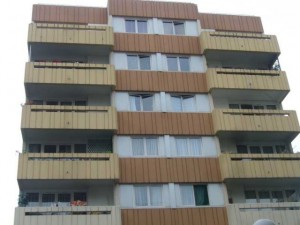
Early last spring (2009) … as a Special Project in preparation for Copenhagen … some very intelligent people in the Office of the City Mayor (who understand the value, but also the limitations, of marketing campaigns !) … organized that 500 typical buildings of the city, from each of the different historical periods up to the present day, would be surveyed using Infra-Red Thermography. To complement the building surveys … an aerial survey of the whole city was also carried out. The results will be placed in the public domain … for all in Paris to see … during 2010.
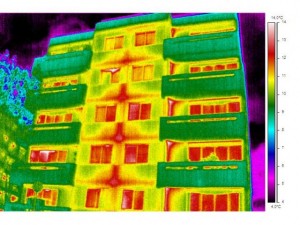
The following Project Description was contained in the French Design e-Newsletter ‘Maison à Part’ (www.maisonapart.com), dated Friday 23rd October 2009. This description is more interesting and informative than a similar description on the City Mayor’s WebSite (www.paris.fr) !
.
Une Thermographie Parisienne Instructive …
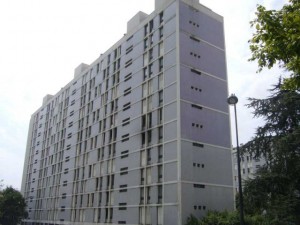
A l’occasion des Journées Parisiennes de l’Énergie et du Climat du 22 au 25 Octobre 2009, la ville de Paris présente pour la première fois les résultats de la campagne de photographies en infrarouge de la capitale. Cette carte thermographique permet d’analyser les bâtiments énergivores.
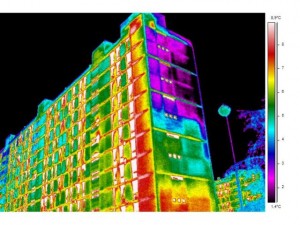
A six semaines de l’ouverture de la Conférence des Nations-Unies sur le Changement Climatique à Copenhague, la ville souhaite montrer son engagement dans la lutte contre le réchauffement climatique. C’est tout l’objet des deuxièmes journées parisiennes énergie et climat, qui se tiendront du 22 au 25 Octobre au Palais Brongniart à Paris. L’occasion également de découvrir pour la première fois, lors d’une exposition, une carte thermographique des immeubles parisiens. Réalisée sur 500 bâtiments de style et d’âge différents, elle permet de se rendre compte de toutes les déperditions d’énergie et de trouver ainsi les solutions adéquates. Chaque Parisien pourra ainsi découvrir sur une carte géante de Paris, son immeuble et sa performance énergétique.
.
Des Prises de Vue Révélatrices …
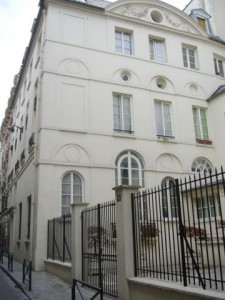
Mais d’où viennent ces photos ? “La nuit du vendredi 6 mars 2009, l’ensemble du territoire parisien a été thermographié depuis un avion” est-il expliqué. “La thermographie aérienne est une technique qui permet de mesurer la température à la surface des toitures à l’aide d’une caméra infrarouge et d’analyser la déperdition de chaleur des constructions.” Ainsi, “plus le toit apparaît rouge, plus il est chaud, ce qui signifie qu’une partie de l’énergie dépensée pour chauffer le logement est en fait perdue dans l’atmosphère.” Une campagne de prises de vue des façades à l’aide d’une caméra thermique – l’hiver en début de soirée, lorsque le thermomètre est en dessous de 5°C – réalisée par la ville permet de compléter l’ensemble.
“Chaque grande période de construction à Paris est analysée sous l’angle architectural et thermique, avec des préconisations de travaux pour chacune” précise les organisateurs de l’exposition.
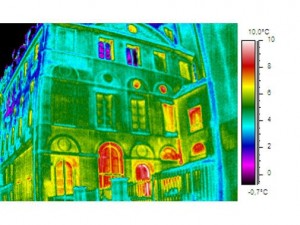
Courant 2010, un Site Internet représentant chaque type d’immeuble devrait être mis en place, grâce auquel chacun pourra “tirer des préconisations générales” en matière d’économies d’énergie pour son propre immeuble, même si “cette photographie ne remplace pas un diagnostic thermique”, a précisé à l’AFP l’adjoint à l’environnement de la Mairie de Paris, Denis Baupin. Le Site montrera quatre photos de façade par bâtiment, la couleur rouge symbolisant les pertes d’énergie les plus importantes.
.
.
END

